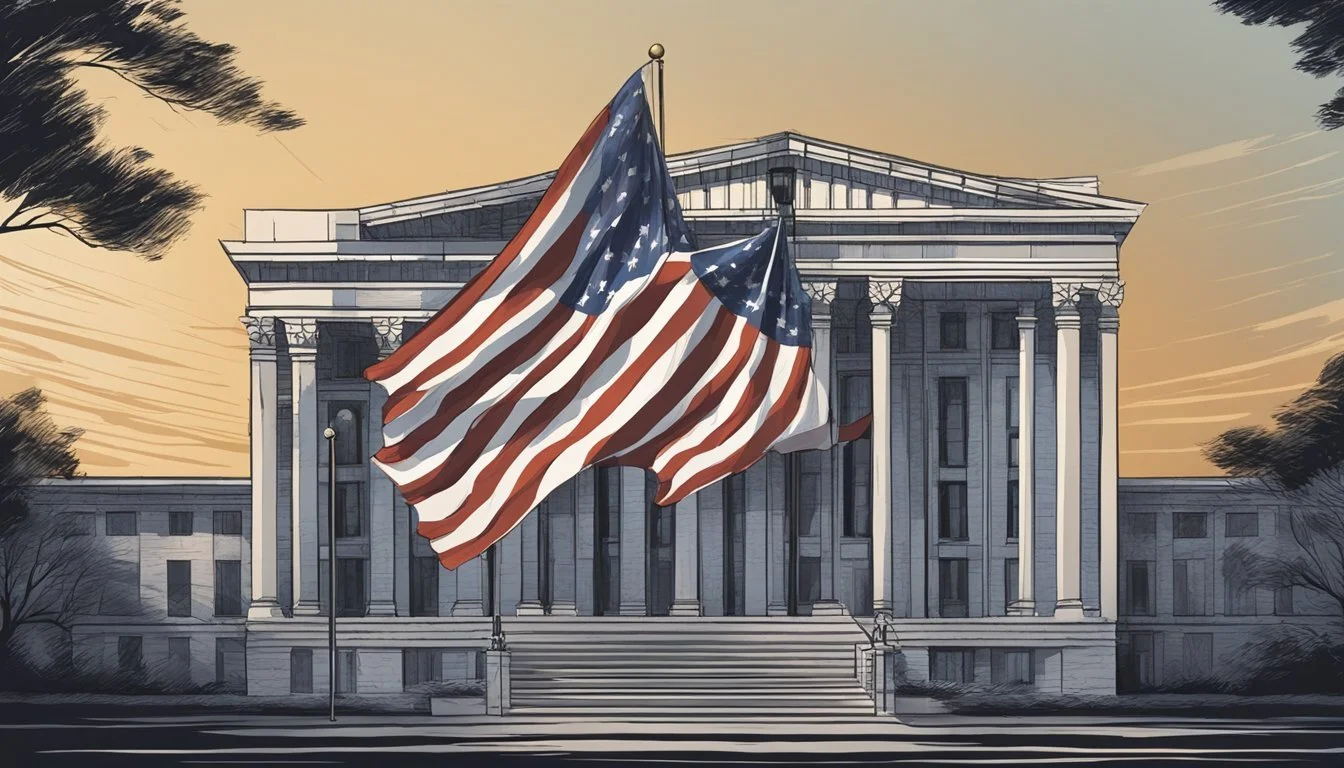Exploring the Concept of Patriotism in The Night Agent: Duty and Loyalty in Modern Espionage
"The Night Agent" on Netflix explores the complex concept of patriotism through its gripping storyline and diverse characters. Based on Matthew Quirk's novel, this action-thriller series delves into the world of espionage and political intrigue, challenging viewers' perceptions of loyalty and duty to one's country.
The show presents patriotism as a multifaceted ideal, often blurring the lines between personal ethics and national interests. Through its protagonist's journey, "The Night Agent" examines the sacrifices and moral dilemmas faced by those who serve their nation. The series skillfully weaves together elements of action and suspense while prompting viewers to question the true meaning of patriotism in today's complex geopolitical landscape.
As "The Night Agent" continues to captivate audiences, it offers a nuanced portrayal of patriotism that goes beyond simple flag-waving. The show's success lies in its ability to balance heart-pounding action with thought-provoking themes, making it a standout addition to Netflix's thriller offerings.
The Genesis of 'The Night Agent'
"The Night Agent" emerged from Matthew Quirk's novel and transformed into a gripping Netflix series through Shawn Ryan's adaptation. This journey from page to screen involved creative writing, meticulous planning, and strategic production decisions.
Original Novel by Matthew Quirk
Matthew Quirk penned "The Night Agent" in 2019, crafting a suspenseful political thriller. The novel introduced Peter Sutherland, a low-level FBI agent who becomes embroiled in a dangerous conspiracy.
Quirk's story skillfully blended elements of espionage, politics, and personal drama. His writing captured the attention of readers and industry professionals alike.
The book's success laid the foundation for its eventual adaptation to television. Quirk's detailed world-building and complex characters provided rich source material for the screen version.
Adaptation for Television by Shawn Ryan
Shawn Ryan, known for creating "The Shield," took on the task of adapting "The Night Agent" for Netflix. Ryan's expertise in crafting intense, character-driven dramas made him an ideal choice for the project.
The adaptation process began in 2020. Ryan worked to translate Quirk's intricate plot and characters into a visually compelling series.
He maintained the core elements of the novel while expanding certain aspects to suit the television format. Ryan's adaptation aimed to capture the book's tension and intrigue for a broader audience.
Production and Development
Netflix greenlit "The Night Agent" as an original series, investing in its potential as a high-stakes thriller. The production team faced the challenge of bringing the complex world of political espionage to life on screen.
Casting played a crucial role, with Gabriel Basso selected to portray Peter Sutherland. The production design focused on creating authentic settings that reflected the story's Washington D.C. backdrop.
Filming took place under strict protocols due to the ongoing pandemic. Despite these challenges, the team successfully completed production, resulting in a polished, suspenseful series that quickly gained popularity on Netflix.
Premise and Central Themes
"The Night Agent" explores complex themes of patriotism, duty, and national security within a high-stakes political thriller framework. The series delves into the moral challenges faced by those sworn to protect their country.
The Intersection of Loyalty and Duty
Peter Sutherland, an FBI agent, embodies the core conflict between personal loyalty and professional duty. His unwavering commitment to his role as a night agent exemplifies the weight of responsibility in serving one's nation.
The Night Action Manual serves as a symbolic representation of this burden. It outlines the protocols and expectations placed upon those entrusted with safeguarding national interests.
Peter's actions throughout the series highlight the difficult choices agents must make when personal relationships clash with official duties.
Conspiracies and National Security
The show weaves a intricate web of conspiracies that threaten national security. These plots test the characters' resolve and push them to their limits.
Rose Larkin, initially an outsider, becomes entangled in the dangerous world of covert operations. Her involvement sheds light on how ordinary citizens can be drawn into extraordinary circumstances.
The series explores the far-reaching consequences of high-level corruption and the lengths to which some will go to maintain power.
Trust becomes a scarce commodity as characters navigate a landscape filled with deception and hidden agendas.
Ethical Dilemmas and Moral Ambiguities
"The Night Agent" presents characters with complex ethical dilemmas, forcing them to question their beliefs and values. The line between right and wrong often blurs in the face of national security threats.
Peter and Rose grapple with situations where the "greater good" conflicts with personal morality. Their choices reveal the psychological toll of operating in a world of secrets and lies.
The show examines how individuals maintain their integrity when faced with morally ambiguous decisions. It raises questions about the true nature of patriotism and the sacrifices required to uphold it.
Character Profiles
"The Night Agent" features a diverse cast of characters whose motivations and loyalties drive the plot forward. These complex individuals grapple with issues of patriotism and duty in a high-stakes political landscape.
Peter Sutherland: The Low-Level FBI Agent
Peter Sutherland starts as an unassuming FBI agent working the night shift at the White House. His father's alleged treason casts a shadow over his career, fueling his determination to prove himself.
Peter's unwavering sense of duty and sharp instincts propel him into a web of conspiracy. As he navigates treacherous waters, his loyalty to country is tested against personal relationships and moral dilemmas.
His journey from low-level operative to key player in uncovering a vast conspiracy showcases his growth and resilience. Peter's character embodies the struggle between blind patriotism and questioning authority when faced with corruption.
Rose Larkin: The Tech CEO with a Secret
Rose Larkin enters the story as a successful tech CEO, but her life takes a dramatic turn when she becomes entangled in a dangerous plot. Her technical expertise proves invaluable as she partners with Peter to unravel the conspiracy.
Rose's character highlights the intersection of technology and national security. Her background in the private sector offers a unique perspective on government operations and the potential for both innovation and exploitation.
As the story progresses, Rose grapples with the weight of her newfound knowledge and the responsibility it brings. Her journey explores themes of civic duty and the personal cost of standing up for what's right.
Supporting Cast: Allies and Adversaries
The supporting characters in "The Night Agent" add depth and complexity to the narrative. Loyal allies like Chelsea Arrington, Peter's colleague, provide crucial support and showcase the importance of trust in high-pressure situations.
Adversaries such as Vice President Redfield and Omar Zadar present formidable challenges, embodying different facets of corruption and betrayal. Their actions force the protagonists to question the true nature of patriotism and loyalty.
FBI Director Diane Farr serves as a complex figure, blurring the lines between ally and potential threat. Her character illustrates the intricate power dynamics within government agencies and the difficult choices faced by those in positions of authority.
The Story Arc Across Seasons
"The Night Agent" series explores patriotism through its evolving storylines and character development. Each season builds upon the previous, deepening the exploration of loyalty, duty, and national service.
Inception and Growth: Season 1
Season 1 introduces FBI agent Peter Sutherland as he begins work at the White House. The Night Action Manual serves as his guide into covert operations. Peter uncovers a conspiracy involving high-ranking officials and foreign agents.
The metro bombing incident sets the stage for Peter's journey. He partners with tech CEO Rose Larkin to investigate the attack and its connections to broader threats.
Character relationships develop, particularly between Peter and Rose. Their loyalty to each other and the country is tested as they face dangerous situations and moral dilemmas.
Expansion of the Narrative: Season 2
Season 2 expands Peter's role as a night agent. He takes on new missions that challenge his beliefs and skills. The narrative explores deeper themes of patriotism and the costs of national security.
Peter's understanding of loyalty evolves as he encounters complex geopolitical situations. His actions have far-reaching consequences, affecting international relations.
New characters are introduced, adding diverse perspectives on patriotism and duty. These additions create tension and force Peter to reassess his own values.
Continuation and Cliffhangers: Season 3
Season 3 delves into the long-term effects of Peter's previous missions. His past decisions come back to haunt him, testing his resolve and patriotic commitment.
The storytelling becomes more intricate, weaving together multiple plot threads. Peter's personal life and professional duties increasingly conflict, raising questions about the nature of true patriotism.
A major cliffhanger sets up future seasons, leaving viewers to ponder the ultimate price of loyalty to one's country. The season ends with Peter facing a crucial decision that will define his understanding of patriotism.
Dissecting the Show's Elements
"The Night Agent" combines intense action, visual storytelling, and political intrigue to create a gripping spy thriller. The series leverages various elements to keep viewers engaged and invested in its narrative.
Action Sequences and Tension Building
The show excels in crafting heart-pounding action sequences. High-stakes chases and combat scenes punctuate the plot, maintaining a fast pace. Tight editing and strategic camera angles heighten the tension during these moments.
The series uses suspense effectively, often leaving viewers on the edge of their seats. Cliffhangers at episode ends compel audiences to continue watching. The constant threat of danger to the characters adds to the overall sense of urgency.
Sound design plays a crucial role in amplifying the intensity of action scenes. Sharp gunshots and explosive impacts create an immersive auditory experience.
Cinematographic Decisions and Symbolism
"The Night Agent" employs deliberate visual choices to enhance its storytelling. Dark, shadowy settings reflect the clandestine nature of espionage work. Contrasting this, brightly lit government offices represent the public face of power.
The show uses color symbolism subtly. Cool blue tones often signify technology and surveillance, while warmer hues may indicate personal moments or domestic scenes.
Camera movements contribute to the narrative. Smooth tracking shots during calm moments give way to shaky handheld footage in tense situations, mirroring the characters' emotional states.
Political and Espionage Intrigue
Political machinations form the backbone of the series' plot. The show explores themes of loyalty, betrayal, and the moral complexities of national security.
Characters navigate a web of secrets and lies, creating a layered narrative. Power dynamics shift as alliances form and break, keeping viewers guessing about true motivations.
The series delves into the psychological toll of espionage work. It portrays the stress and isolation agents face, adding depth to their characters.
Realistic depictions of intelligence gathering and analysis provide insight into the world of modern spycraft. The show balances action with cerebral elements, appealing to fans of both thriller and drama genres.
Setting and Real-World Connections
"The Night Agent" leverages its setting to explore themes of power, corruption, and patriotism against a backdrop of familiar American landmarks and institutions. The show's locations and historical references enhance its authenticity and relevance.
Washington D.C.: A Stage for Power and Corruption
Washington D.C. serves as the primary setting for "The Night Agent," providing a fitting backdrop for the series' political intrigue. The White House features prominently, symbolizing the pinnacle of American power and decision-making. Other iconic locations like the National Mall and various government buildings create a sense of authenticity.
The show portrays D.C. as a complex web of political relationships and hidden agendas. Corruption seeps through the halls of power, challenging the protagonists' moral compasses. This depiction reflects real-world concerns about the influence of special interests and the potential for abuse of power in the nation's capital.
Filming Locations and Their Significance
While set in Washington D.C., much of "The Night Agent" was filmed in Vancouver, Canada. The production team carefully selected locations to mimic the architecture and atmosphere of the U.S. capital. Some scenes were shot in New York City to capture its unique urban landscape.
Key locations include:
The Vancouver Convention Centre (doubling as a D.C. government building)
The University of British Columbia (standing in for various institutional settings)
Stanley Park (used for scenes set in Rock Creek Park)
These choices allowed the show to maintain visual authenticity while benefiting from Canadian production incentives.
Historical References and Accuracy
"The Night Agent" incorporates real-world historical events and political structures to ground its fictional narrative. The show references actual U.S. government agencies and protocols, such as the FBI and Secret Service operations.
The series also draws inspiration from:
Cold War-era espionage tactics
Post-9/11 national security measures
Recent cybersecurity threats and election interference concerns
While taking creative liberties, the show strives to reflect contemporary geopolitical tensions and the evolving nature of national security threats. This attention to detail helps viewers connect the fictional plot to real-world issues, enhancing the story's relevance and impact.
The Cultural Impact
"The Night Agent" has made a significant mark on contemporary television culture. The show's exploration of patriotism and duty resonates with viewers, sparking discussions about national service and loyalty.
Viewers' Engagement and Binge-Watching Culture
Netflix's release strategy for "The Night Agent" fueled binge-watching behavior. All episodes dropped simultaneously, allowing viewers to consume the entire season at their own pace.
This approach led to intense social media buzz and water-cooler conversations. Fans shared theories, favorite moments, and character analyses online, creating a virtual community around the show.
The series' popularity contributed to the ongoing trend of appointment television giving way to on-demand viewing. This shift has implications for how audiences consume and interact with content.
Social Themes and Representation
"The Night Agent" tackles complex social issues through its diverse cast and storylines. The show portrays characters from various backgrounds, reflecting modern American society.
It explores themes of trust, loyalty, and the balance between personal and professional ethics. These elements resonate with viewers navigating similar challenges in their own lives.
The series also addresses gender roles in traditionally male-dominated fields like espionage. Female characters hold positions of power and influence, challenging stereotypes and providing role models for viewers.
By incorporating timely social themes, "The Night Agent" sparks conversations about representation and inclusivity in media. This approach has broadened its appeal and contributed to its cultural impact.








